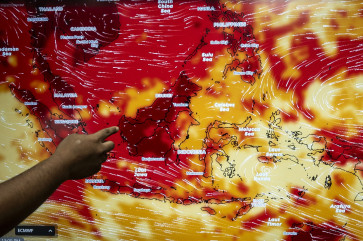RI launches anti-trafficking partnership
West Java, West Nusa Tenggara and South Sulawesi will be the sites for pilot projects for Indonesia’s program to stop human trafficking, launched by the government and its UN counterparts
Change Size

W
est Java, West Nusa Tenggara and South Sulawesi will be the sites for pilot projects for Indonesia’s program to stop human trafficking, launched by the government and its UN counterparts.
The three provinces are notorious sources of human trafficking.
Women’s Empowerment and Child Protection Minister Linda Amalia Sari Gumelar said on Thursday that empowering human trafficking victims was critical to handling and preventing human trafficking, which shows an increasing trend in the country.
“In the program, we will empower poor communities — especially the women and girls — to protect themselves against these crimes,” she said.
“We will also develop models to prevent human trafficking and rehabilitate victims in the targeted provinces,” she added.
The two-year program will receive US$2.3 million from the UN Trust Fund for Human Security (UNHSTF). The program is a partnership between the International Organization for Migration (IOM), the United Nations Population Fund (UNFPA), the World Health Organization (WHO) and the Indonesian government.
According to 2011 IOM data, Indonesia ranks at the top of major sources of trafficked persons. As of June, there were 3,909 Indonesian trafficking victims — 90 percent of whom were women. About 84 percent of the victims were young girls.
Data from the Agency for the Placement and Protection of Indonesian Migrant Workers (BNP2TKI) shows that about 6 million Indonesians are working abroad, but the Foreign Ministry says only 3,294,000 workers are registered.
According to Linda, human trafficking victims are forced to work under poor working conditions not only as domestic workers but also as drug couriers or sex workers.
Daniel Nihill, head of the IOM Mission in Indonesia, said the country had experienced significant developments in addressing the issue of trafficking women and children.
He pointed to the success of passing the Law on the National Anti-Trafficking Plan, which laid the foundation for promoting stronger cross-border and domestic anti-trafficking measures and protection for victims and witnesses of the crime.
The government’s anti-trafficking task force, starting from the national, provincial, regional and district levels, succeeded in providing a firm foundation for ensuring that the efforts were carried out nationwide.
Under the partnership, each UN agency is expected to share their expertise with each other.
“We [the IOM] will be responsible for services and training providers, including improving law enforcement capacity needed to protect the victims and handling human trafficking cases,” Nihill said.
UNFPA country representative for Indonesia Jose Ferraris said the agency created its prevention of human trafficking in targeted, high-risk villages in Sambas, Indramayu and East Lombok through community and school-based awareness programs.
“We aim to reach 10,000 vulnerable households in the three districts,” he said.









